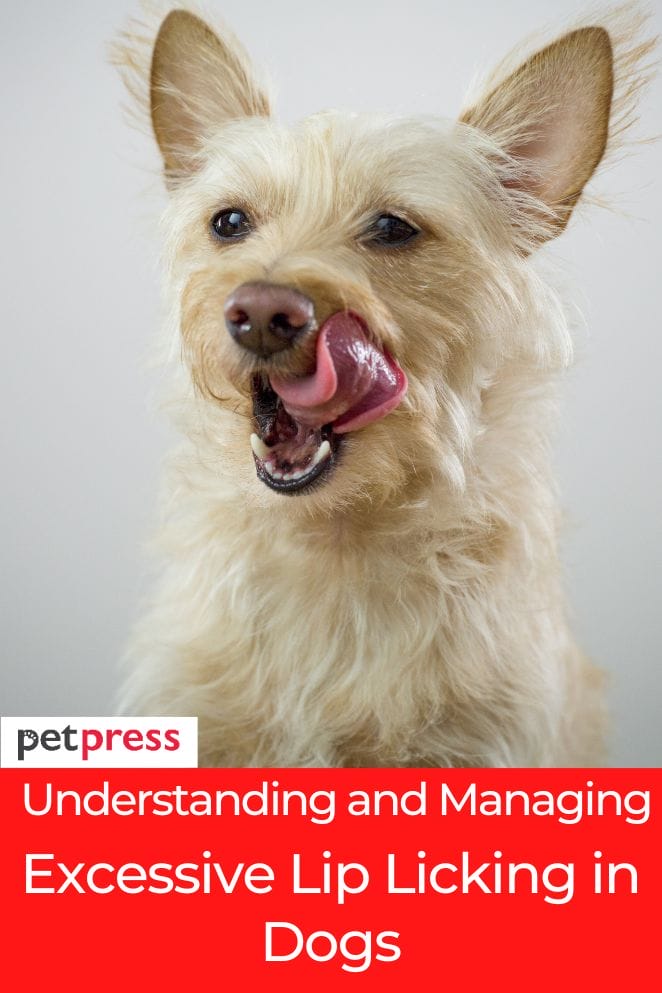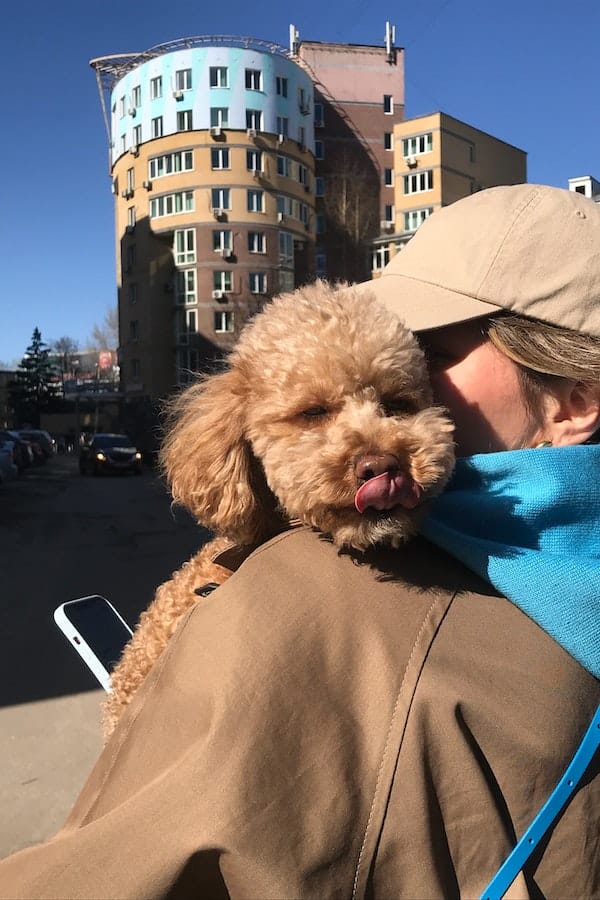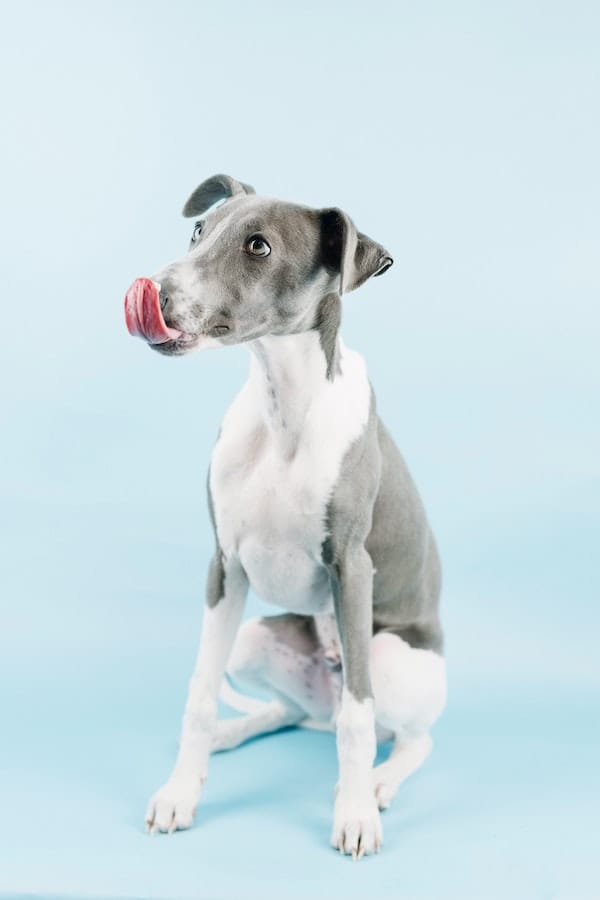
As a dog owner, you might have noticed unconventional behavior in your beloved friend – extreme lip licking.
While occasional lip licking is considered normal and can show satisfaction or expectation, extreme lip licking can be a sign of fundamental concerns.
This article plans to explore the possible reasons for excessive lip licking in dogs and propose practical suggestions to address and prevent this way of behaving.
By understanding the underlying causes and carrying out appropriate strategies, you can ensure the well-being and happiness of your canine companion.
Common causes of excessive lip licking in dogs

Excessive lip licking can be an indication of numerous underlying issues and can range from behavioral to medical.
The following are the common reasons for excessive lip licking in dogs.
Stress or anxiety
Dogs sometimes show excessive lip licking as a reaction to anxiety or stress.
This behavior fills in as a self-soothing mechanism, indicating that they might be feeling overwhelmed by their environmental factors.
It’s essential to recognize and address the basic reasons for this stress to help your dog with feeling more at ease.
By recognizing the triggers and implementing proper strategies, you can uphold your dog friend in dealing with their anxiety and promote a quiet and comfortable environment for them.
Nausea or gastrointestinal upset
Extreme lip licking can also be an indication of nausea or gastrointestinal issues.
Dogs might lick their lips trying to track down relief from stomach-related discomfort.
If your dog is showing excessive lip licking, it’s essential to assess different side effects like appetite loss, vomiting, and diarrhea to decide whether there is an underlying medical condition.
Allergies
Excessive lip licking in dogs can in some cases indicate the presence of allergies.
Very much like humans, canines can be sensitive to specific food sources, environmental allergens, or medications, which can set off inconvenience and irritation.
Subsequently, dogs might engage in excessive lip licking as a natural method for easing the irritation or itchiness caused by the allergen.
Oral discomfort
Excessive lip licking in dogs can sometimes indicate oral discomfort.
Conditions like periodontal disease or oral abscesses can prompt pain and irritation, leading dogs to participate in excessive lip licking as a method for reducing their discomfort.
If you notice your dog showing this behavior, it’s vital to treat their oral health in a serious way.
Tips on how to prevent excessive lip licking

Excessive lip licking can be an indication of underlying issues, some of which might require medical attention.
In any case, there are a few reasonable tips that you can take to help with ensuring your furry companions stay comfortable and decrease the probability of excessive lip licking.
Regular vet check-ups
Regular veterinary check-ups are essential for guaranteeing your dog’s overall health and well-being.
These check-ups play an essential part in identifying any underlying medical conditions that could be causing excessive lip licking.
By discussing your concerns with a veterinarian, you can get expert advice and guidance tailored to your dog’s particular needs.
They might prescribe specific treatments or dietary adjustments to reduce any distress your dog is experiencing and address the underlying cause of the excessive lip licking.
Create a safe environment
Establishing a safe and comfortable environment for your dog is urgent in preventing excessive lip licking.
This involves giving a quiet and secure space where your dog can relax and feel calm.
Try not to expose them to loud noises or sudden environmental changes that might cause stress or anxiety.
Moreover, be aware of potential allergens in their environmental surroundings that could set off the discomfort.
Invest in quality chew toys
Ensuring your furry companion has access to high-quality chew toys is a fantastic strategy for keeping them engaged and discouraging excessive lip licking.
These toys act as a healthy source of your little guy’s energy and can redirect their attention from any anxiety or distress they might experiencing.
By offering them stimulating chew toys, you can give them a productive and enjoyable activity that prevents excessive lip licking and promotes their overall well-being.
Maintain oral hygiene
Keeping up with proper oral hygiene is crucial for your furry friend’s overall well-being and can add to the prevention of excessive lip licking.
Integrating a regular teeth cleaning routine, giving dental chews, and using other suggested oral cleanliness items can assist with ensuring that your little guy enjoys a healthy mouth, free from any likely discomfort or irritation.
By focusing on their oral well-being, you are taking proactive ways to improve their overall personal quality of life and reduce the probability of excessive lip licking.
Monitor diet
Being aware of your furry companion’s diet is essential to guarantee they get the important vitamins and nutrients for optimal health.
It is crucial to try not to take care of them with food varieties that might trigger allergies or cause gastrointestinal issues, as these might possibly result in excessive lip licking.
By cautiously choosing and giving a decent and reasonable eating routine for your little guy, you can help with limiting the possibilities of discomfort and promote their overall well-being.
By following these tips, you can help with ensuring that your furry companion is healthy and comfortable, while additionally helping with reducing the probability of excessive lip licking.
If you’re actually worried about your little guy’s excessive lip licking, it’s best to talk with your veterinarian for extra advice and treatment options.
Conclusion
Extreme lip licking in canines can show a scope of underlying issues, which could be connected with physical well-being or emotional health.
As a responsible pet person, it’s critical to pay attention entirely to your canine’s behavior and address any concerns quickly.
If you notice your canine engaging in excessive lip licking, it’s prudent to look for guidance from a certified veterinarian to address any potential medical issues.
Remember, focusing on your canine’s happiness and well-being is fundamental for staying aware of their overall well-being.
- Does Cat Litter Melt Ice? The Complete Guide to Winter Safety - January 30, 2026
- Happy Tail Dogs: Understanding This Common Canine Condition - January 29, 2026
- How Cold Can Outdoor Cats Handle? Feline Winter Safety - January 27, 2026


GIPHY App Key not set. Please check settings